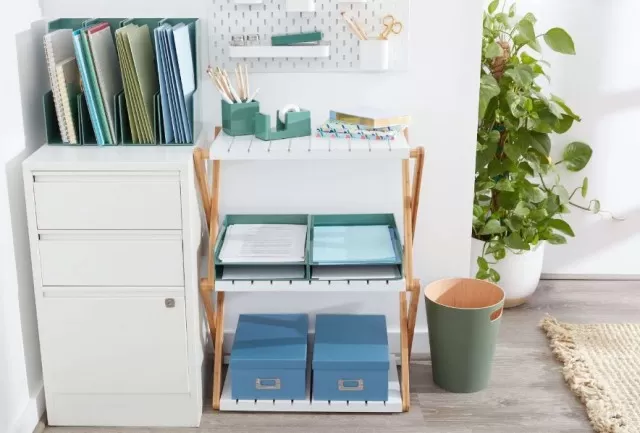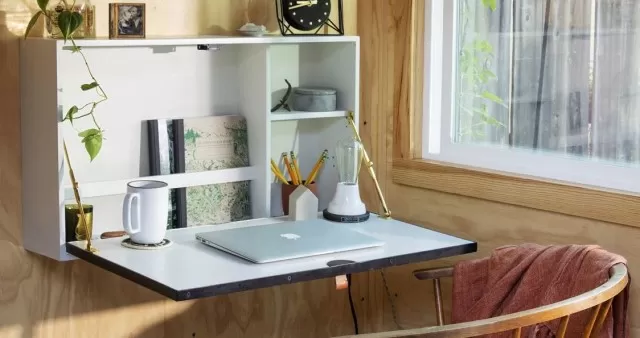Incorporating the following organizing habits into your Daily Routine will not only contribute to an organized space.
As an expert in organizing and someone who personally deals with ADHD, I understand the desire to have a clean and tidy home without feeling overwhelmed by the process.
Through my experience, I’ve discovered that the key to achieving this balance is by implementing straightforward systems and schedules that are easy to maintain. By investing a bit of effort upfront and consistently tackling small tasks, you can prevent clutter from accumulating and create a more organized environment.
Incorporating the following organizing habits into your daily routine will not only contribute to an organized space but also enhance your schedule and overall mental well-being.
Simple Ways to Be More Organized

Make Your Bed.
Start your day by taking a minute to make your bed.
It sets a positive tone and gives your bedroom a tidy appearance. You don’t need to use complicated techniques, simply straighten the sheets and fluff the pillows.
You can do this while waiting for the shower to warm up or delegate the task to your partner if they wake up later.
Corral Everyday Items.
Designate a specific spot for items you use or carry with you daily.
Place a tray in your entryway for keys, sunglasses, and wallet, or use a lazy Susan on the bathroom vanity to keep deodorant, toothbrush, and mouthwash in one place. This prevents you from frantically searching for essential items that could make you late.
Remember to consistently return these items to their designated spots after use.
Use a Dry-Erase Board Calendar.
Employ a dry-erase board calendar as a practical way to stay organized.
While digital calendars have their advantages, a physical dry-erase calendar allows you to quickly jot down small reminders that might otherwise slip your mind. Whether it’s running errands or making quick notes, a dry-erase calendar provides a constant visual reminder.
Consider incorporating it into a family command center for efficient communication.
Go Paperless.
Reduce paper clutter by going paperless with statements and bills.
Minimize the amount of junk mail you receive by unsubscribing from mailing lists and opting out of credit card or insurance offers. Taking a few minutes to unsubscribe will save you time sorting through mail in the long run.
Redirecting people to helpful resources like an FTC article can guide them in reducing unwanted mail.
Keep It Simple.
Establish a straightforward organization system for papers and other belongings you need to keep.
Choose wall-mounted or desktop sorters, file boxes, or small cabinets to manage important documents. Keep storage labels concise and easy to understand.
Overly intricate systems can become overwhelming to maintain. Apply this principle to other areas of your life, such as your email inbox or pantry, by minimizing categories and keeping things streamlined.

Clear Surfaces (and the Sink).
Take a few minutes each day to put away items that are out of place or cluttering surfaces in your home.
Use trays or baskets to collect common countertop clutter-like chargers, preventing them from creating visual chaos. A tidy sink or dish strainer at the end of the day enhances the overall neatness of your kitchen.
Habit Stack.
Maximize your time by combining tasks and finding opportunities for multitasking.
For example, sort through the mail while waiting for the coffee to brew, wipe down counters while the oven is preheating, or clean your bathroom while the tub fills. By habit stacking, you streamline your schedule and accomplish more in less time.
Batch Tasks and Time Block.
Group similar tasks together and allocate specific time blocks to focus on them.
Instead of answering emails as they come in throughout the day, set aside dedicated periods for email management. Similarly, designate specific times during the week for meal prepping or complete it all in one go on the weekend.
Batching tasks and time blocking increase efficiency and reduce stress.
Plan Ahead.
Create a schedule for regular activities like meal preparation, laundry, cleaning, and personal grooming.
Customize a routine that works for you most of the time, considering travel or work deadlines. While flexibility is necessary, having an organized schedule for recurring tasks helps you stay on track and maintain order in your daily life.
Set a Timer.
Set a timer for mundane tasks like tidying up to increase motivation and productivity.
Challenge yourself to accomplish as much as possible within the allotted time. Even if you don’t finish everything, you’ll make more progress than if you hadn’t attempted to clean at all.
Consider exploring the Pomodoro technique, known for improving productivity within shorter time frames.

Declutter Regularly.
Maintain an organized space by letting go of items as frequently as you bring them into your home.
Keep a donation bag in your closet and add items to it as you come across them. Donate the bag to a local charity when it’s full.
Regularly check and discard expired medicines and toiletries. Clean out Your Fridge, freezer, and pantry weekly to eliminate expired or unwanted items.
These habits keep you in the mindset of decluttering and significantly contribute to staying organized.
Think Before Buying.
Combat clutter by avoiding impulsive shopping.
Take time to evaluate whether you truly need or want an item before purchasing it. Leave items in your online cart for a day or more to consider their necessity.
You might find that you can borrow the item from a friend or realize that it’s not essential to your life.
Dispose of small miscellaneous items that accumulate around your home.
Place a small garbage bin or bag in your car and empty it regularly. Toss any random trash that finds its way into your purse at the end of each day.
Keep a basket in your bedroom to collect clothing tags or other small items that would otherwise clutter your dresser.
Don’t Fight the Bedroom Chair.
If you have a designated spot where clothes accumulate, such as a bedroom chair or ottoman, embrace it rather than fight against it.
However, make it a habit to clear the space at least once per week. When doing laundry, sort through the stack and decide if you’ll wear the clothes in the coming days or if they should be washed and properly put away.
*The information is for reference only.